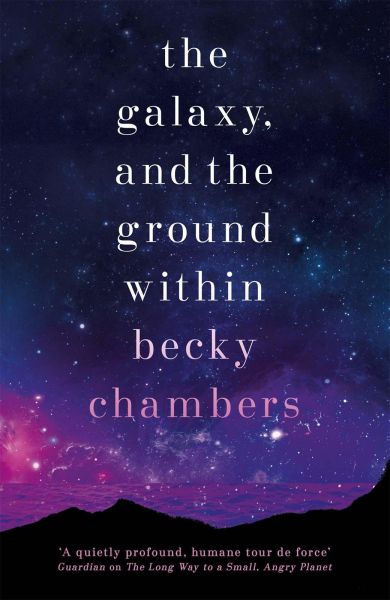Way Station
The Galaxy, and the Ground Within (Wayfarers, volume 4)
By Becky Chambers

9 Jun, 2022
2021’s The Galaxy, and the Ground Within is the fourth and final volume in Becky Chambers’ Wayfarers series.
The planet Gora is the galaxy’s Milton, Ontario1; it’s an unremarkable lifeless world save for one thing: convenient location. It’s a well-placed waystation for travellers on their way from one hospitable world to another.
Ouloo, a Laru, runs the Five-Hop One-Stop on Gora; her small business supplies fuel, housing, food, bathing, and other amenities. She is assisted by her adolescent (by Laru standards) child Tupo. Ouloo’s patrons come and go, their stays brief. At least, their stays are brief until the disaster.
A sky full of flaming debris signals catastrophe. A Kessler cascade has destroyed Gora’s many communications satellites. Communication between Gora and the rest of the universe is cut off, as is travel. Travellers who have planned on a brief Gora stay will have to remain there until the debris is cleared and communications are re-established.
As so often is true of random assortments of people at unremarkable way stations, the travellers are a diverse lot. They come from several species and cultures; they have personal backstories that will greatly complicate their interactions.
● Speaker, an Akarak, was travelling with her sibling Tracker. The Akaraks are planetless nomads, beneficiaries of centuries of prejudiced neglect from the Galactic Commons. Akaraks avoid undue contact with other Commons species and rely on each other. Not only is Speaker trapped on Gora with a collection of non-Akaraks, but Tracker is trapped in orbit … if Tracker is still alive.
● Pei, an Aeluon, was travelling to meet Ashby, her human lover. Romances between humans and Aeluons are frowned upon by other Aeluons and Pei has been careful to keep the affair a deep, dark secret. Were this situation not fraught enough, Pei discovers while trapped on Gora that she is fertile. This is a rare and coveted opportunity for Aeluons. If she had no other plans, she would retire to a child-rearing community, which would fertilize her egg and then raise the child while she resumes her career. Child? Or lover? She faces a painful choice.
● Roveg, a Quelin, was exiled from his home world for cultural crime. He has jumped through bureaucratic hoops to qualify for a brief visit to Vemerang, there to see his sons. He has to arrive by the specified time. The state would love to further punish him; there will be no forgiveness if he is late. Will the orbital debris be cleared in time?
In other circumstances travellers and innkeeper would have interacted briefly and superficially. Now they cannot avoid extended contact … and potential conflict.
~oOo~
I thought I would compare and contrast this book with the movie Bus Stop, so refreshed my memory of the movie’s plot, I discovered that I had forgotten everything about Bus Stopexcept that it was set in a bus stop and starred Marilyn Monroe. How many movies about bride-theft did Hollywood make, anyway? Maybe I should have gone with Lifeboat or Stage Coach. More research. Except for the fact both feature a way station, there is no similarity between the two. So much for that gambit.
Successful series have a built-in audience. Hence it can be hard for an author to forgo the benefits of writing yet another book in the series. Even if the author resists the siren call of the series in the near term, they may find themselves revisiting their world much later (Foundation, Eight Worlds [2]), urged by motives about which I can only speculate. In some cases the author has killed off the protagonist and has been forced by public outcry to revive the series lead (Sherlock Holmes).
Will author Chambers be able to resist to resist the clamour of her fans for more Commons novels? It’s been a year and she’s published two Monk and Robot novellas, so perhaps she is, as she stated, moving on.
This book is definitely not a thriller, not an adventure novel. It’s a quiet story about people who are forced to interact, are changed by their experiences, and carry on afterward … but not in ways that they would have expected.
I couldn’t fully engage with this book, though I didn’t hate it. I liked some elements of the setting, such as a deeper look at the Commons. It turns out not to be a shiny utopia, but a fragile peace between former combatants. A peace that may not be fair to some of its members (the Akaraks). The characters are diverse and interesting; I wanted things to go well for them. But I wanted more plot, more incident than the author supplied. This book didn’t come up to my expectations for a novel.
This is up for a Hugo, so clearly, I am in the minority here. If you’re looking for a Hugo-nominated novel in which the conflict is limited to harsh words, where people who normally avoid each other must interact, in space (or at least on an alien world), then this is a novel you might like.
The Galaxy, and the Ground Within is available here (Amazon US), here (Amazon Canada), here (Amazon UK), here (Barnes & Noble), here (Book Depository), and here (Chapters-Indigo).
1: Trust me, this is funny to Ontarians.
2: Not to mention series in which the focus jumps to the next generation. That can be successful (the Vorkosigan series shifting focus from Cordelia to Miles) or an abject failure (Poul Anderson’s A Game of Empire, which focused on Flandry’s bastard daughter Diana). I’m sure there must be more such series, but none come to mind at the moment. Remind me?
